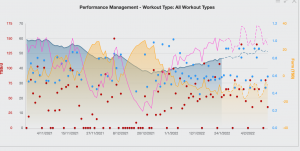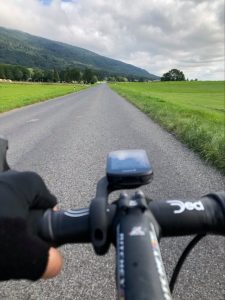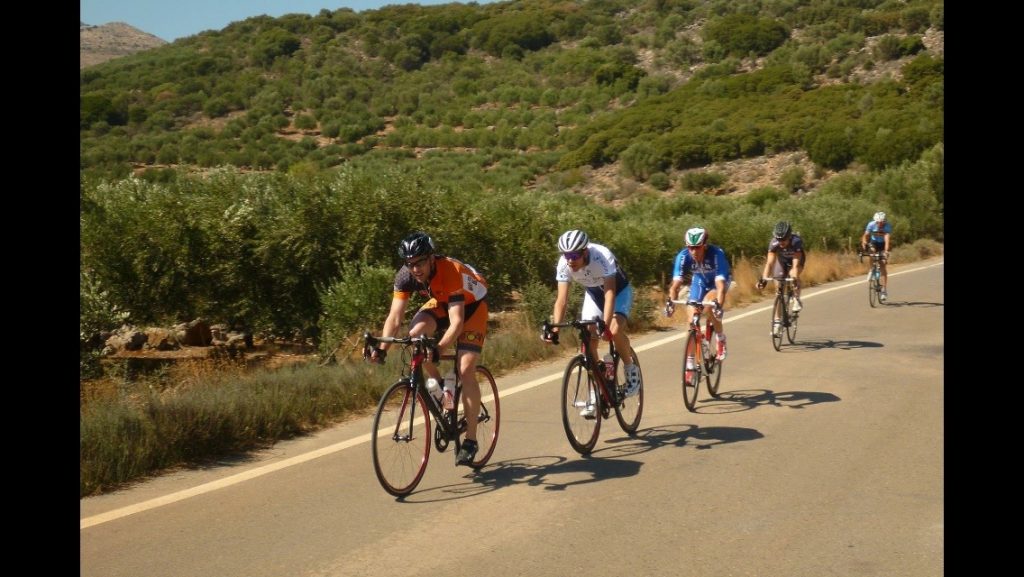Useful Links

Returning from a break in training
What caused you to have a gap?
There are loads of reasons why you might need to or have to take a break from training:
- Injury
- Illness
- Holiday
- Family pressures
- Work Pressures
- Life Stress
- End of the season
- After a big goal has been achieved
- Just to name a few!!
And within that, the reasons you might take a break vary wildly….changing jobs, moving house, new baby…it could be anything really.
This post has mainly been inspired by my recent absence from training. I’m usually extremely consistent, training between 5 and 8 x per week, every week all year, apart from I usually take 2-3 weeks of an offseason…where I do no cycling!
I’m not a pro rider, so life sometimes gets in the way of what is ideal, but this year, it happened in a big way. The disruption with very limited cycling was in 1 month period, where I didn’t have my bikes for 3 out of 4 weeks! However, the disruption goes a bit deeper than that and will I’d bet be a scenario that is familiar to many riders.
My family and I decided to move to Switzerland. So the disruption started from about May 2021 when the waiting for confirmation of jobs and permits was happening, all the way to the move in July/August training had to take a back seat.
From a training frequency standpoint, looking at my Training Peaks it doesn’t look too bad, the quality wasn’t there. I was stressed to the absolute limit, I wasn’t sleeping and I was eating all the wrong foods…and for that matter, too much food!
Looking at the PMC Chart
As you can see, there are still plenty of red dots, so I was training for most of this period. However, as I say, the quality wasn’t there and I knew if I pushed harder this would have tipped the balance too far and I would have got ill.
It’s not just the training stress that counts, it’s the total life stress. So I did as much as I felt I could. It’s easy in this scenario to push to hard, ignore the life stress and compound the issue by getting ill.
As you can see there was a week of no training where my bikes were taken by the moving company. I did a few rides on a training bike while on holiday the following week, then there is a two-week wait for my bikes to arrive in Switzerland (in itself extremely stressful!!).
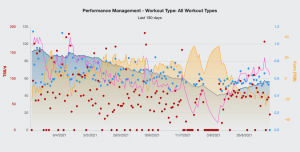
Turning the corner
When things settled down my fitness felt like it was completely gone (even if it hasn’t really, it still feels poor). Though CTL is not a pure measure of fitness, it had dropped from 85-90 at the end of my build period, I won a National Title and did my second fastest 10TT ever!! It was down to 40 when I did my first ride in Switzerland.
To compound the issue, the rubbish sleep and poor diet contributed to my going from my normal race weight of 75-76kg up to 83kg…REALLY not ideal when you move to such a hilly country!!
Returning to training
To test or not to test?
Personally, though it’s tempting to see where you are as you know you’ll get a big boost in the second test…and that always feels good. There’s no real need in my opinion. It’s unnecessary stress both physically and psychologically.
Returning to training in my view should consist of frequent, lower stress, lower intensity training. As you can see on the PMC chart, I did about 2 weeks of training roughly 6x per week, but none of it with any intensity. Just get back to the routine, enjoy the riding and keep the intensity low.
After those two weeks, I added a couple of intervals in my rides 1 x per week and when I got the chance I did a longer ride, but kept the intensity low.
The emphasis when returning to training should be on building what is sustainable. Don’t rush in like a bull at a gate and end up ill or burnt out or compromising more important areas of your life.
If you get back to some nice low intensity riding with good frequency and consistency, the fitness will come, BE PATIENT!
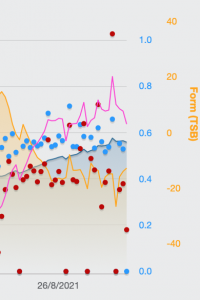
My training peaks PMC from my return to today

On the descent from the Col de Romme

From the top of the Col de la Colmbiere
I was lucky whenreturning to training; once the move had happened there was not a huge amount of ongoing stress, so once training started again it wasn’t really interrupted. This may not always be the case. If there are ongoing challenges, it’s important to factor in that stress and not build training stress too quickly…you’ll just get ill!!
I was in the middle of summer at a. weight I feel is 7kg too much for me. It would be easy to try and crash diet and force the weight back down. I would advise caution with this approach, that is another added stress you really don’t need.
I find that as training gets back on track I’m more able to be consistent in other areas, like nutrition. Consistency is key, get back into good habits around your eating, but don’t deprive yourself or consistency and sustainability will suffer. Cutting out the things you know you don’t need and some consistent training and things will start heading back in the right direction.
As of this am, I’ve lost 3kg’s since getting back to training, so a nice improvement in this time frame. Continued consistency will get me the next 3kg’s in time.
Different needs depending on why?
Clearly, when returning to training, everyone’s circumstances are individual. And the reason why you had to take a break will influence how you return:
- If it was due to injury, your training frequency and volume may have to take into account the adaptation of the injured tissue.
- If it was an illness, a longer, more gradual build-up may be required to avoid a relapse, which no one wants.
- A particularly long break may also require a more gradual build-up.
- If there are ongoing life stresses, you may need to prioritise and though you start training, you keep life in balance with lower frequency, volume and intensity…a bit like I did in the build-up to my move to Switzerland.
Summary of key points
There are plenty of mistakes to be made when returning to training and plenty of traps to fall in to during this really tricky time for a keen athlete:
- Not recognising the stresses and pushing too hard, making yourself ill.
- Trying to jump back into training at the same level you left off!
- Being too hard on yourself for things like lack of fitness, increased weight, inconsistent training…you have to be kind to yourself here, adding more stress doesn’t lead anywhere good.
- Make small, short term goals that are achievable.
- Enjoy being bike to training and be patient.
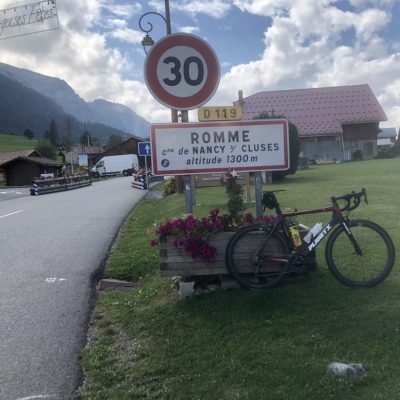
Any questions
If you have any questions or comments you can ask them in the comments section below or email:

